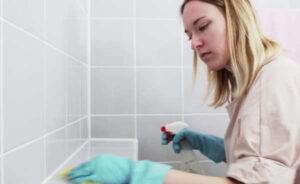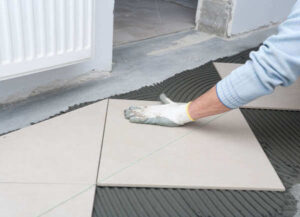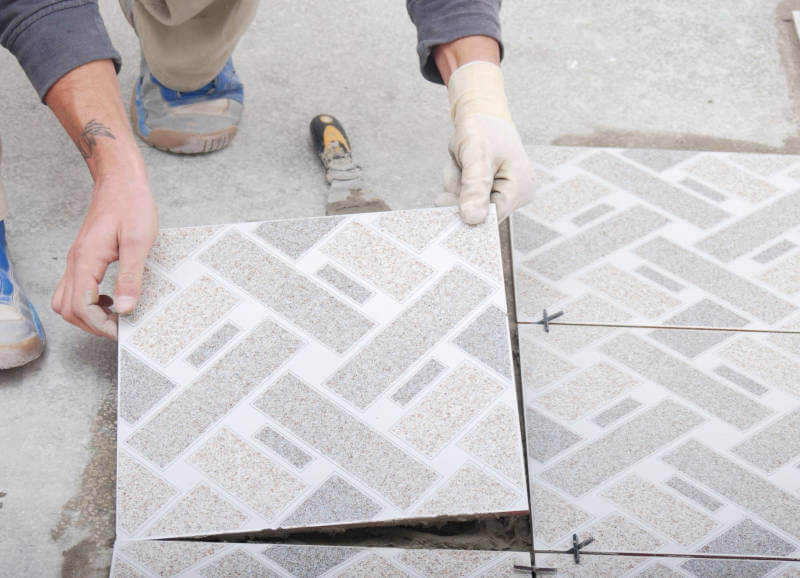Tile floors continue to grow in popularity for a variety of reasons. But with the increase in the use of tile flooring, there are also concerns being raised about tiles being a health risk. Is this true? Can tile floors affect your health?
Tiles don’t pose specific risks that majorly affect your health. If tiles had severe impacts on a person’s health, they wouldn’t be used in construction and inside most buildings. The most popular as well as the most affordable tiles are both safe and won’t have long-term implications on your health.
The truth is that standards and practices have changed a lot over the years. Where once, many kinds of common floor tiling may have had problems with emitting toxic chemicals, nowadays, regulations are tighter to protect our health.
Are tiles harmful for health?
Tiles used in modern construction are not harmful to your health. Any tile flooring option that you may choose today doesn’t have a major risk to your health in the short or long term. Every aspect of building, including all building materials, have to pass a health safety standard to be used for construction. Any toxic aspects that can harm your health won’t pass safety tests. This means that the tiles that you use for flooring won’t consist of harmful substances that can affect your health.
The reason there has been cause for concern about the health risks of tiles in the past comes from chemicals. There was a range of more toxic chemicals that used to be commonly used in floor tiling. These include formaldehyde, polyvinyl chlorides, and volatile organic compounds. All these chemicals served a variety of functions in the production of tiles in the past and were health risks.
Today, most tiles are chemical-free, which decreases the risk of floor tiles being harmful to your health. There are still certain tiles that have a higher mix of chemicals than others. For example, vinyl can contain a mix of potentially toxic chemicals. But these chemicals are stabilised in vinyl’s tile form, stopping any risk to your health from vinyl tiles. These harmful chemicals are only released if the tiles burn. With this in mind, it’s best not to have a vinyl tile kitchen backsplash!
Is tile flooring good for health?
Tile flooring isn’t bad for your health, but it also doesn’t boost your health; it is a neutral, safe flooring option. There aren’t active benefits for your health by having tile flooring, but it is easier to clean tiles compared to other flooring options.
Compare tile flooring to carpet flooring as an example. Carpet easily traps a range of dirt, bacteria, and chemicals inside the fibres. Dust mites, dander, particle pollution, mould spores and more can also easily end up trapped in the carpet. It can be harder to identify these in carpet, making your carpet dirty without you realising. Tile flooring doesn’t have this same problem.
Tiles are smooth with no fibres to trap dirt. The dirt sits on top of the tile and can easily be spotted and cleaned. Mould can still commonly grow on/between tiles in wet areas. This is something to keep in mind if you’re adding a bathroom to your house or renovating any wet area. But, again, this is easily spotted and cleaned. Both carpet and tiles won’t impact your health as long as you clean regularly.
What is the least toxic tile?
The two most common and least toxic tiles to use are ceramic and stone tiles. Ceramic tiles are the most popular and commonly used tile option in today’s market. They don’t emit any harmful chemicals at all and are made from clay. The process of creating ceramic tiles involves shaping the tiles using clay and baking them. There aren’t added chemicals that will increase health risks or toxicity.
Stone tiles, at least natural stone, are also completely chemically neutral. This can depend, of course, on a few factors. ‘Stone’ can include a lot of quite different things. If it is manufactured stone, then there’s a higher likelihood of chemical intervention in the production process. That said, it’s still very unlikely to be of any real concern. Any stone that is simply quarried and shaped will not contain anything toxic. If stone was a toxic building material, there wouldn’t be as many advantages to stone houses or popularity in building them.
There are many other tile options that aren’t toxic. These include cork, linoleum, and bamboo. The options for tile flooring are more diverse and varied than ever, with next to no toxins in any tile!
Is tile cement toxic?
Once tiles have been placed and the cement has dried, tile cement doesn’t pose issues of toxicity. The chemicals used in tile cement can be harsh and unpleasant to come in contact with. But this is only a danger during the process of installing the tiles. Tilers wear safety masks and other protective equipment to ensure they aren’t exposed to toxic aspects of tile cement while installing tiles.
Once tile cement has dried, any toxicity is trapped in the solid form and doesn’t pose a risk to your health. It’s the dust that tile cement can emit that may cause issues. During installation or removal, the dust has a chance to cause toxic effects on health. Again, this is why tilers wear masks to protect themselves from inhaling dust. But once the cement is placed and left undisturbed to dry, it is not a risk.
The same is true for any kind of modern tile adhesive, really. As long as you keep yourself protected with a mask and goggles while it is being installed, it poses no toxic threat to you whatsoever.
Does tile give off radiation?
Tiles can give off radiation, but this shouldn’t be a cause to panic. It’s important to realise that we are all exposed to background radiation constantly. Some areas of the world are more radioactive than others. But there is radiation everywhere to some degree. So, being exposed to extremely low levels of radiation from tiles is not dangerous to your health.
 Ceramic tile, for instance, can show increased radioactive activity when used in flooring. But the concentration simply isn’t enough to pose any real threat of health risks. Ceramic materials are commonly mined from potassium minerals, containing uranium.
Ceramic tile, for instance, can show increased radioactive activity when used in flooring. But the concentration simply isn’t enough to pose any real threat of health risks. Ceramic materials are commonly mined from potassium minerals, containing uranium.
But this is only mildly higher than what we are ordinarily exposed to. People in some areas of the world—such as Iran—are exposed to much higher and more constant levels of radiation with no adverse effects.
This is also a common concern in stone tiles of various kinds since stone also contains background levels of radiation. Again, though, it’s nothing close to dangerous levels, and not something you need to worry about.
So, there is no cause for concern when it comes to tile flooring and your health. Knowing this, you can go ahead and figure out whether tiles are the best material for your house designs!
While you’re considering the materials used for houses, check out our other article talking about the best brick for home construction. For the best quality bricklaying and masonry tools, visit our Paragon Masonry Tools store today!



